广东省河源中国教育学会中英文实验学校八年级英语下册 Unit 7 Topic 2 I’m not s
- 格式:doc
- 大小:116.06 KB
- 文档页数:4
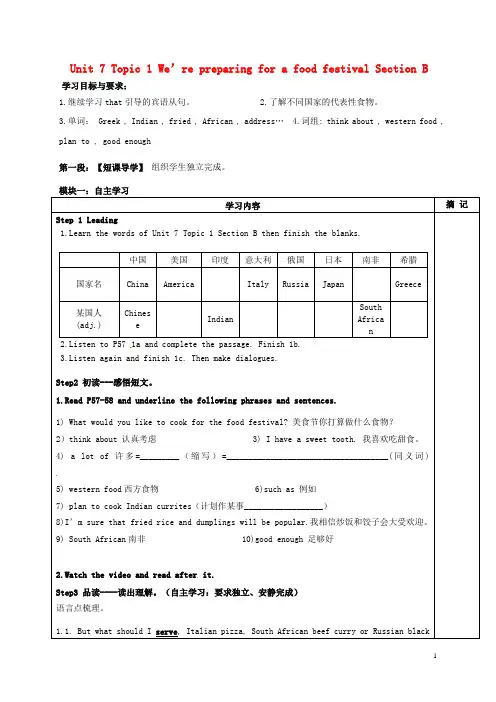
Unit 7 Topic 1 We’re preparing for a food festival Section B学习目标与要求:1.继续学习that引导的宾语从句。
2.了解不同国家的代表性食物。
3.单词: Greek , Indian , fried , African , address…4.词组: think about , western food , plan to , good enough第一段:【短课导学】组织学生独立完成。
学习内容摘记Step 1 Leading1.Learn the words of Unit 7 Topic 1 Section B then finish the blanks.中国美国印度意大利俄国日本南非希腊国家名China America Italy Russia Japan Greece某国人(adj.) ChineseIndianSouthAfrican2.Listen to P57 1a and complete the passage. Finish 1b.3.Listen again and finish 1c. Then make dialogues.Step2 初读---感悟短文。
1.Read P57-58 and underline the following phrases and sentences.1) What would you like to cook for the food festival? 美食节你打算做什么食物?2)think about 认真考虑 3) I have a sweet tooth. 我喜欢吃甜食。
4) a lot of 许多=_________(缩写)=_____________________________________(同义词)5) western food西方食物 6)such as 例如7) plan to cook Indian currites(计划作某事__________________)8)I’m sure that fried rice and dumplings will be popular.我相信炒饭和饺子会大受欢迎。
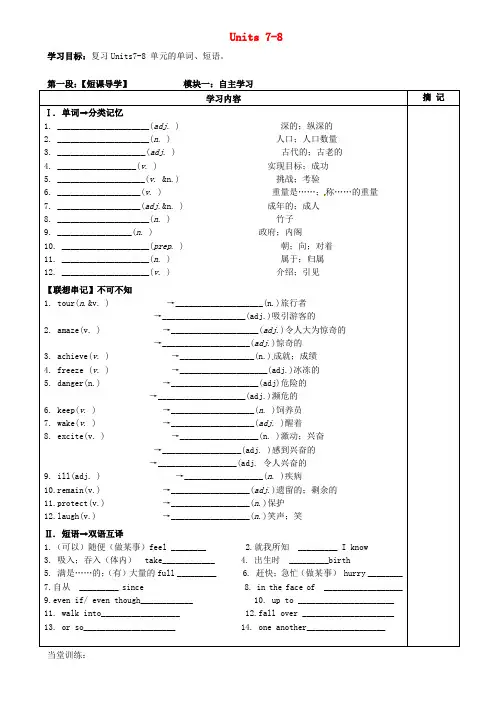
Units 7-8学习目标:复习Units7-8 单元的单词、短语。
学习内容摘记Ⅰ. 单词➡分类记忆1. _____________________(adj. ) 深的;纵深的2. _____________________(n. ) 人口;人口数量3. ____________________(adj. ) 古代的;古老的4. __________________(v. ) 实现目标;成功5. ____________________(v. &n.) 挑战;考验6. ___________________(v. ) 重量是……;称……的重量7. ___________________(adj.&n. ) 成年的;成人8. _____________________(n. ) 竹子9. _________________(n. ) 政府;内阁10. ____________________(prep. ) 朝;向;对着11. ____________________(n. ) 属于;归属12. ____________________(v. ) 介绍;引见【联想串记】不可不知1. tour(n.&v. ) →____________________(n.)旅行者→___________________(adj.)吸引游客的2. amaze(v. ) →____________________(adj.)令人大为惊奇的→____________________(adj.)惊奇的3. achieve(v. ) →_________________(n.)成就;成绩4. freeze (v. ) →____________________(adj.)冰冻的5. danger(n.) →____________________(adj)危险的→____________________(adj.)濒危的6. keep(v. ) →___________________(n. )饲养员7. wake(v. ) →___________________(adj. )醒着8. excite(v. ) →__________________(n. )激动;兴奋→__________________(adj. )感到兴奋的→__________________(adj. 令人兴奋的9. ill(adj. ) →__________________(n. )疾病10.remain(v.) →__________________(adj.)遗留的;剩余的11.protect(v.) →__________________(n.)保护ugh(v.) →__________________(n.)笑声;笑Ⅱ. 短语➡双语互译1.(可以)随便(做某事)feel ________2.就我所知 _________ I know3. 吸入;吞入(体内) take____________4. 出生时 _________birth5. 满是……的;(有)大量的full _________6. 赶快;急忙(做某事) hurry ________7.自从 _________ since 8. in the face of __________________9.even if/ even though____________ 10. up to ______________________11. walk into__________________ 12.fall over _____________________13. or so_____________________ 14. one another__________________当堂训练:一、单项选择。

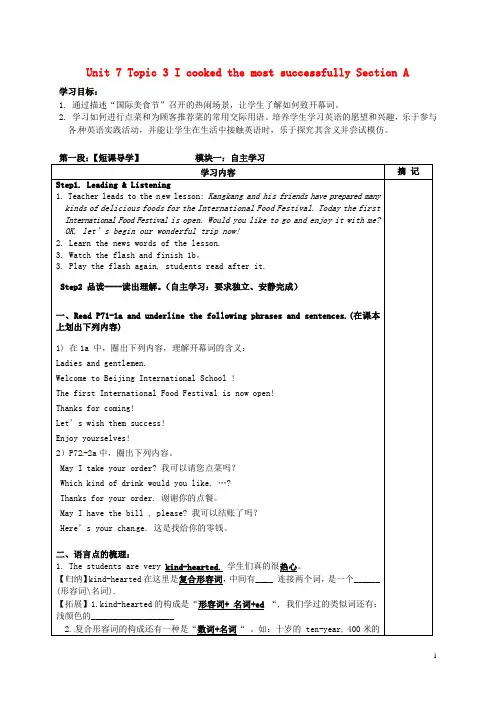
Unit 7 Topic 3 I cooked the most successfully Section A学习目标:1. 通过描述“国际美食节”召开的热闹场景,让学生了解如何致开幕词。
2. 学习如何进行点菜和为顾客推荐菜的常用交际用语。
培养学生学习英语的愿望和兴趣,乐于参与各种英语实践活动,并能让学生在生活中接触英语时,乐于探究其含义并尝试模仿。
第一段:【短课导学】模块一:自主学习学习内容摘记Step1. Leading & Listening1. Teacher leads to the n ew lesson: Kangkang and his friends have prepared manykinds of delicious foods for the International Food Festival. Today the first International Food Festival is open. Would you like to go and enjoy it with me?OK, let’s begin our won derful trip now!2. Learn the news words of the lesson.3. Watch the flash and finish 1b。
3. Play the flash again, stud ents read after it.Step2 品读----读出理解。
(自主学习:要求独立、安静完成)一、Read P71-1a and underline the following phrases and sentences.(在课本上划出下列内容)1) 在1a 中,圈出下列内容,理解开幕词的含义:Ladies and gentlemen.Welcome to Beijing International School !The first International Food Festival is now open!Thanks for coming!Let’s wish them success!Enjoy yourselves!2)P72-2a中,圈出下列内容。
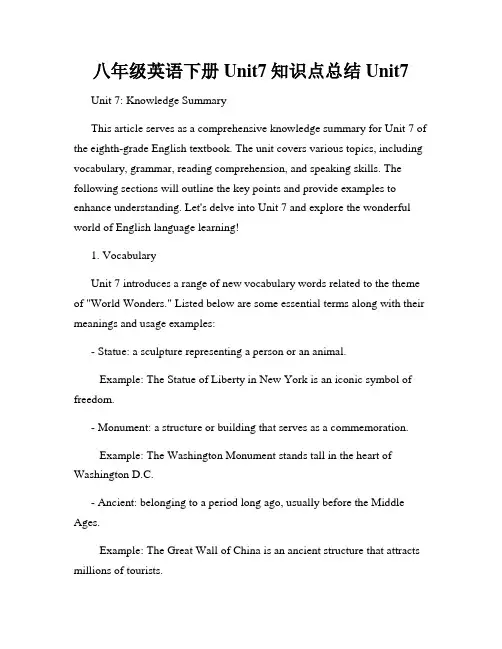
八年级英语下册Unit7知识点总结Unit7Unit 7: Knowledge SummaryThis article serves as a comprehensive knowledge summary for Unit 7 of the eighth-grade English textbook. The unit covers various topics, including vocabulary, grammar, reading comprehension, and speaking skills. The following sections will outline the key points and provide examples to enhance understanding. Let's delve into Unit 7 and explore the wonderful world of English language learning!1. VocabularyUnit 7 introduces a range of new vocabulary words related to the theme of "World Wonders." Listed below are some essential terms along with their meanings and usage examples:- Statue: a sculpture representing a person or an animal.Example: The Statue of Liberty in New York is an iconic symbol of freedom.- Monument: a structure or building that serves as a commemoration.Example: The Washington Monument stands tall in the heart of Washington D.C.- Ancient: belonging to a period long ago, usually before the Middle Ages.Example: The Great Wall of China is an ancient structure that attracts millions of tourists.- Cathedral: a large and important Christian church.Example: The Notre-Dame Cathedral in Paris is a masterpiece of Gothic architecture.- Ruin: the remains of a building, city, or other structures after being destroyed.Example: The ruins of the Roman Colosseum are a reminder of ancient glory.2. GrammarUnit 7 focuses on the study of modal verbs and the passive voice. Understanding how to use modal verbs and form passive sentences is crucial for effective communication in English. Here are the key points related to grammar:2.1 Modal Verbs:- Must: used to express obligation or necessity.Example: We must finish our homework before going out to play.- Can: used to express ability or permission.Example: She can play the piano beautifully.2.2 Passive Voice:- The passive voice is used when the subject of the sentence is acted upon rather than acting.Example: The book was written by Mark Twain. (passive voice)Mark Twain wrote the book. (active voice)3. Reading ComprehensionIn Unit 7, students engage in various reading activities to enhance their comprehension skills. Reading passages related to world wonders are provided, followed by comprehension questions to test understanding. Here are some reading skills and strategies taught in this unit:- Skimming: quickly reading through a text to get a general overview or main idea.- Scanning: quickly searching for specific information or keywords within a text.- Inference: using information from the text to draw conclusions or make educated guesses.4. Speaking SkillsUnit 7 also places emphasis on developing speaking skills. Students are encouraged to express their opinions, describe places, and engage in conversations. As students explore world wonders, they can discuss the following topics:- Which world wonder would you like to visit and why?- Describe a world wonder in detail using appropriate descriptive words.Through these speaking activities, students can improve their fluency, expand vocabulary, and develop confidence in expressing themselves in English.ConclusionUnit 7 encompasses a wide range of essential knowledge points in English language learning. By understanding the vocabulary related to world wonders, mastering modal verbs and the passive voice, and honing reading comprehension and speaking skills, students will enhance their overall proficiency in English. Keep practicing and exploring the fascinating world of English language, and the journey will be rewarding!。
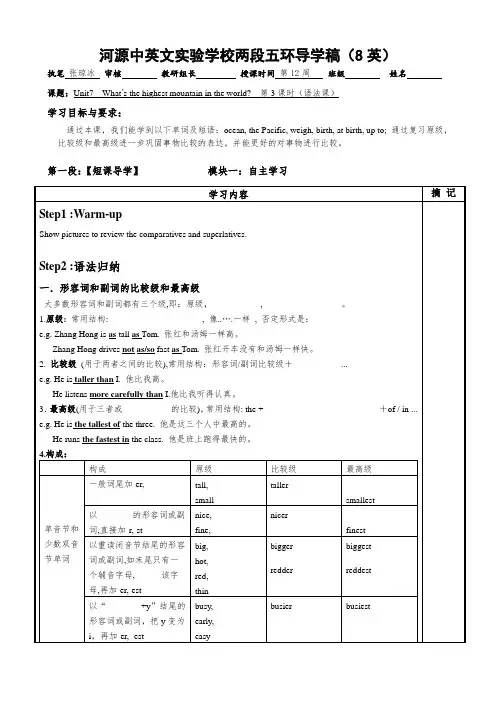
河源中英文实验学校两段五环导学稿(8英)执笔张琼冰审核教研组长授课时间第12周班级姓名课题:Unit7 What’s the highest mountain in the world? 第3课时(语法课)学习目标与要求:通过本课,我们能学到以下单词及短语:ocean, the Pacific, weigh, birth, at birth, up to; 通过复习原级,比较级和最高级进一步巩固事物比较的表达,并能更好的对事物进行比较。
第一段:【短课导学】模块一:自主学习第二段:【长课导学】模块二:交流研讨模块三:巩固内化课题:Unit7 What’s the highest mountain in the world? 第3课时(语法课)姓名:___________模块四:当堂训练一、用所给的词的适当形式填空。
1. Jim is very ______. Li Lei is _________ than Jim. (hungry)2. Kate’s mooncakes are ________ of all. (nice)3. Your box is _______ than mine. But his is ___________ of the three (heavy).4. Unit 2 is quite _____. Unit 3 is ______ than Unit 2. It’s __________ in Module 1.(hard)5. This TV play is _____ than that one. (good)6. My mother is very ______. She is __________ in my family. (busy)7. Lingling gets to school ______ than the others. (early)8. She speaks English _____ in our class. (well)9.— Who would you like to be your assistant, Jack or David?— If I had to choose, David would be the ______ (good) choice.10. — How was your math exam, Nancy?— I think I did it well, although it was ____________ (difficult) than the last one.11. — Did you have a wonderful time at the party?—Yes, it’s the _______________ (exciting) one I’ve ever been to.12.I’d like to know if Linda is the second ______ (tall) girl in her class.二.单选。
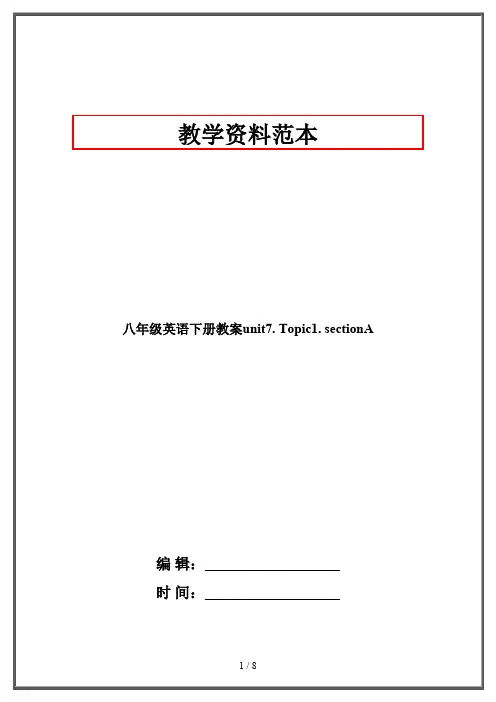
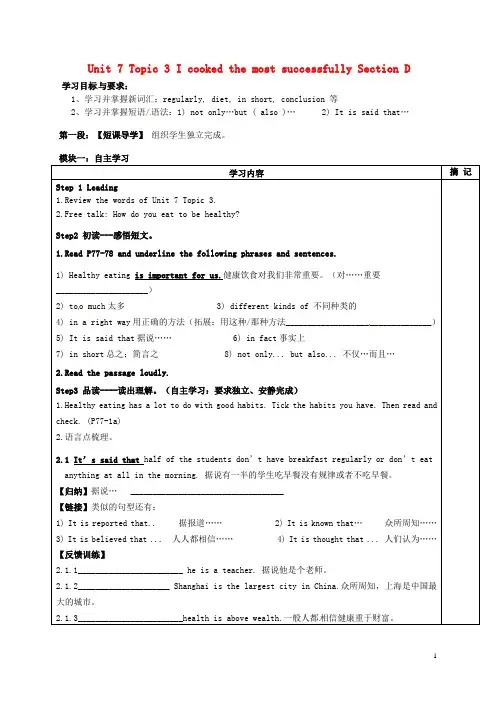
Unit 7 Topic 3 I cooked the most successfully Section D学习目标与要求:1、学习并掌握新词汇:regularly, diet, in short, conclusion 等2、学习并掌握短语/语法:1) not only…but ( also )… 2) It is said that…第一段:【短课导学】组织学生独立完成。
模块一:自主学习学习内容摘记Step 1 Leading1.Review the words of Unit 7 Topic 3.2.Free talk: How do you eat to be healthy?Step2 初读---感悟短文。
1.Read P77-78 and underline the following phrases and sentences.1) Healthy eating is important for us.健康饮食对我们非常重要。
(对……重要_____________________)2) to o much太多 3) different kinds of 不同种类的4) in a right way用正确的方法(拓展:用这种/那种方法_________________________________)5) It is said that据说…… 6) in fact事实上7) in short总之;简言之 8) not only... but also... 不仅…而且…2.Read the passage loudly.Step3 品读----读出理解。
(自主学习:要求独立、安静完成)1.Healthy eating has a lot to do with good habits. Tick the habits you have. Then read and check. (P77-1a)2.语言点梳理。
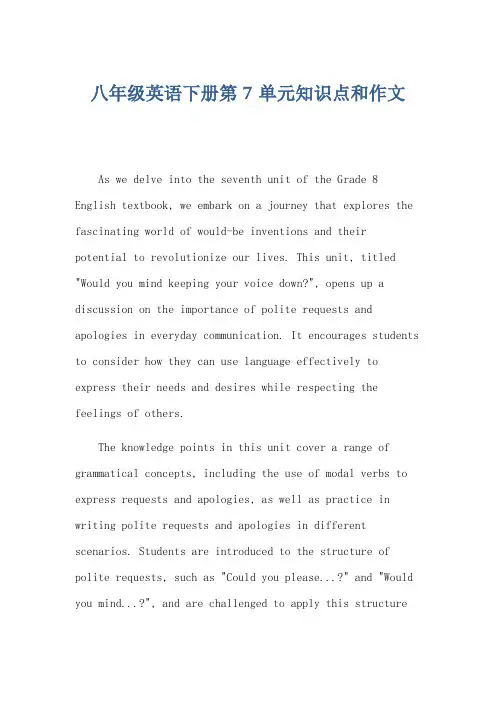
八年级英语下册第7单元知识点和作文As we delve into the seventh unit of the Grade 8 English textbook, we embark on a journey that explores the fascinating world of would-be inventions and theirpotential to revolutionize our lives. This unit, titled "Would you mind keeping your voice down?", opens up a discussion on the importance of polite requests and apologies in everyday communication. It encourages students to consider how they can use language effectively to express their needs and desires while respecting the feelings of others.The knowledge points in this unit cover a range of grammatical concepts, including the use of modal verbs to express requests and apologies, as well as practice in writing polite requests and apologies in different scenarios. Students are introduced to the structure of polite requests, such as "Could you please...?" and "Would you mind...?", and are challenged to apply this structureto real-life situations, practicing their ability to communicate effectively and diplomatically.The writing component of this unit focuses on imaginative writing, asking students to create their own would-be inventions and describe them in detail. This exercise not only tests their understanding of the grammar and vocabulary learned in the unit, but also theircreativity and ability to present ideas clearly and concisely. Students are encouraged to think outside the box, envisioning inventions that could potentially solve real-world problems and improve people's lives.In the realm of vocabulary, the unit introduces new terms related to inventions and technology, such as "inventor," "invention," "robot," and "machine." Students are expected to not only recognize and understand these words but also use them effectively in their writing. This expanded vocabulary helps them to express more complexideas and concepts, enhancing their overall language proficiency.The combination of grammar, vocabulary, and imaginative writing in this unit provides students with a comprehensivelearning experience that is both challenging and engaging. By practicing polite requests and apologies, they learn to communicate more effectively with others, while the exercise in imaginative writing stimulates their creativity and critical thinking skills.In conclusion, the seventh unit of the Grade 8 English textbook is a rich and diverse learning resource that covers a wide range of language skills and concepts. It challenges students to push their boundaries, think critically, and communicate effectively, while also nurturing their imaginations and creativity. Through this unit, students gain valuable insights into the power of language and its role in shaping our interactions with the world.**解锁八年级英语下册第七单元的秘密**当我们深入八年级英语下册的第七单元时,我们踏上了一段探索未来发明及其有可能改变我们生活的潜力的奇妙旅程。
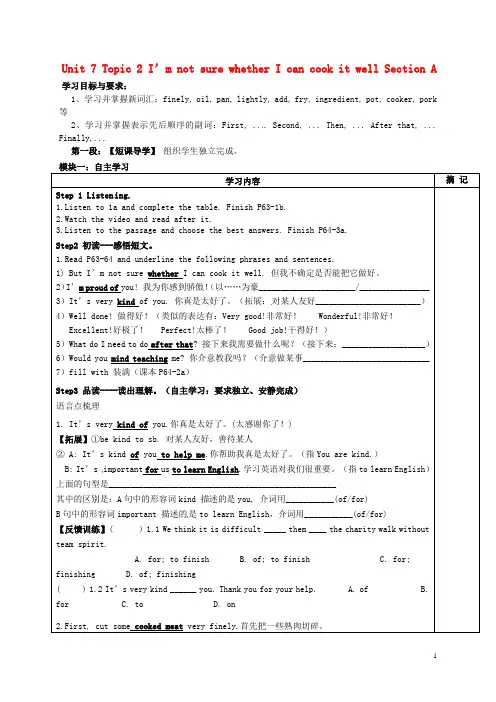
Unit 7 Topic 2 I’m not sure whether I can cook it well Section A学习目标与要求:1、学习并掌握新词汇:finely, oil, pan, lightly, add, fry, ingredient, pot, cooker, pork等2、学习并掌握表示先后顺序的副词:First, ... Second, ... Then, ... After that, ... Finally,...第一段:【短课导学】组织学生独立完成。
模块一:自主学习学习内容摘记Step 1 Listen ing.1.Listen to 1a and complete the table. Finish P63-1b.2.Watch the video and read after it.3.Listen to the passage and choose the best answers. Finish P64-3a.Step2 初读---感悟短文。
1.Read P63-64 and underline the following phrases and sentences.1) But I’m not sure whether I can cook it well. 但我不确定是否能把它做好。
2)I’m proud of you! 我为你感到骄傲!(以……为豪______________________/________________3)It’s very kind of you. 你真是太好了。
(拓展:对某人友好________________________)4)Well done! 做得好!(类似的表达有:Very good!非常好! Wonderful!非常好!Excellent!好极了! Perfect!太棒了! Good job!干得好!)5)What do I need to do after that? 接下来我需要做什么呢?(接下来:___________________)6)Would you mind teaching me? 你介意教我吗?(介意做某事_____________________________7)fill with 装满(课本P64-2a)Step3 品读----读出理解。
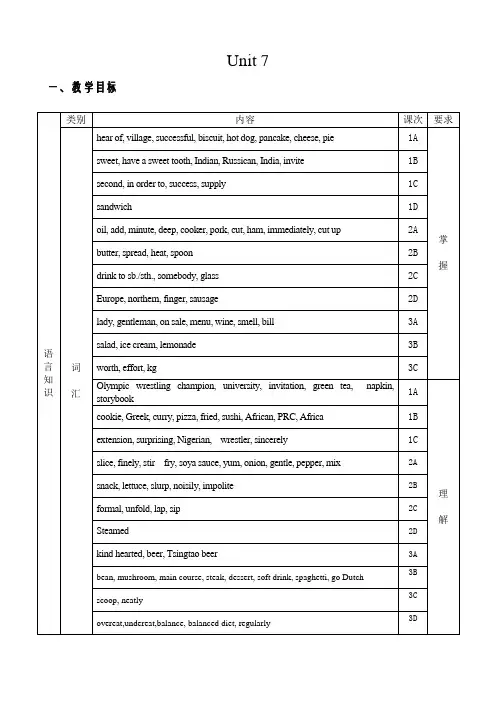
Unit 7一、教学目标slice, finely, stir fry, soya sauce, yum, onion, gentle, pepper, mix二、教学建议Topic 1Section ASection A 需用1课时。
重点活动是1a、2 和3。
教学目标:1. 培养学生乐于助人的品质。
2. 谈论筹集资金的方法。
3. 谈论如何为食物节做准备。
教学过程:第一步:复习回答下列问题, 讨论如何帮助别人。
老师问:If someone is in trouble, what will you do?If someone needs money,what will you do?If someone needs much money, what will you do?老师引导学生用下面的句式回答这些问题。
学生回答:I think I will....第二步:呈现1. 教师向学生出示一张Daniel 的照片,学习新单词和短语:hear of, Olympic wrestling champion, university, village, successful把这些单词写在黑板上。
2. 老师把Daniel的故事讲给学生听。
Daniel Igali is a Canadian athlete. He was born in Nigeria.He is an Olympic wrestling champion. Now, he is still a university student. He wants to build a school for his poor village in Nigeria.But he needs money.3. 播放录音,学生听1a回答下面的问题。
Will Kangkang’s classmates help Daniel Igali?What will they do?第三步:巩固1. 播放录音,让学生跟读并模仿。
八年级英语下册第7单元知识点和作文全文共6篇示例,供读者参考篇1Unit 7: Our Wonderful EarthThis unit has been really interesting to learn about! The main topics covered different aspects of our planet Earth and the environment. Some of the key grammar points included the passive voice, reporting verbs, conditionals, and wishes. Let me break it down:The Passive VoiceWe learned how to form passive sentences, which are useful when we want to emphasize the action rather than who/what performed it. For example: "Trees are being cut down every day" or "The forest has been destroyed by the fire." Using the passive makes the action itself more prominent. The passive is formed with the verb "to be" plus the past participle of the main verb.Reporting VerbsThese allow us to report what someone said, thought, claimed etc. Some common reporting verbs are "say", "tell","think", "believe", "claim" and more. For example: "He said that he would recycle more" or "They claimed that global warming is a serious issue." Reporting verbs are followed by a "that" clause.ConditionalsThese are for discussing hypothetical situations and their consequences. There are different types:Zero conditional for general truths (If you recycle, you help the environment)First conditional for possible future situations (If we don't act now, the damage will be irreversible)Second conditional for hypothetical present situations (If I had a garden, I would grow my own vegetables)Third conditional for hypothetical past situations (If people had been more aware, we wouldn't be in this mess)WishesWe can use "wish" to express desires about present situations that are unlikely to happen or past situations that didn't occur:"I wish I could do more for the environment.""I wish people had taken climate change more seriously years ago."Aside from the grammar, we also learned lots of environment-related vocabulary like "carbon footprint", "sustainable", "renewable energy", "pollution" and much more.For the writing section, we had to write a for-and-against essay about the topic: "Schools should ban cheap stationery made from non-recyclable materials to protect the environment."Here's how I approached the essay:IntroductionStated the issue in a clear topic sentenceOutlined the two sides (for banning vs against banning)Gave my thesis - my personal opinion on the matterBody Paragraph 1: Arguments For BanningUsing cheap non-recyclable materials is extremely wasteful and harms the environmentIt goes against the principles of sustainability that schools should promoteSchools can set a good example by using eco-friendly alternativesBody Paragraph 2: Arguments Against BanningCheap stationery is affordable for students from underprivileged backgroundsRecyclable materials tend to be more expensiveThere are ways to dispose of non-recyclable items responsiblyBody Paragraph 3: My OpinionI believe schools should ban non-recyclable stationery as protecting the environment is crucialHowever, they need to provide affordable eco-friendly optionsSchools should educate students on environmental awarenessConclusionReiterated my thesis stanceEmphasized the importance of environmentalism for future generationsEncouraged the reader to consider their own environmental impactOverall, I felt this unit was incredibly relevant as environmental issues are a major global challenge. The grammar and writing tasks really helped strengthen my ability to discuss and present arguments about sustainability in English. Even though it was quite dense content, I'm glad I had the opportunity to expand my knowledge about our wonderful planet Earth!篇2Unit 7 - A Changing WorldWow, Unit 7 has been a wild ride! We've covered so many topics related to the changing world around us. From technological advancements to environmental issues, it's been an eye-opening experience. Let me break it down for you.First up, we delved into the fascinating world of technology and how it's rapidly transforming our lives. We learned about cutting-edge innovations like artificial intelligence, virtual reality, and renewable energy sources. It's mind-blowing to think about how far we've come in such a short time. Who would have thought that we'd have robots assisting us in daily tasks or thatwe could explore distant galaxies from the comfort of our homes?Speaking of exploration, we also discussed the impact of technology on space exploration. The recent Mars rover missions and the successful launch of the James Webb Space Telescope have given us unprecedented insights into the cosmos. It's incredible to think that we're unlocking the secrets of the universe, one discovery at a time.But with great advancements come great challenges. We couldn't overlook the environmental issues that our changing world is facing. Climate change, deforestation, and pollution are serious threats that demand our attention. It was eye-opening to learn about the devastating effects of human activities on our planet and the urgent need for sustainable practices.One topic that really struck a chord with me was the concept of eco-friendly living. We discussed simple yet effective ways to reduce our carbon footprint, such as recycling, conserving energy, and adopting a plant-based diet. It's empowering to know that even small changes in our daily habits can have a significant impact on the environment.Another fascinating aspect of this unit was exploring the role of technology in education. Online learning platforms, virtualclassrooms, and interactive educational apps are revolutionizing the way we acquire knowledge. It's incredible to think that we can now access a wealth of information and connect with experts from around the globe with just a few clicks.But with all these advancements, it's important to strike a balance and maintain a sense of human connection. We discussed the importance of face-to-face interactions, outdoor activities, and unplugging from our devices from time to time. It's a reminder that while technology can enhance our lives, it should never replace the value of real-life experiences and human connections.Overall, Unit 7 has been an eye-opening journey into the ever-changing world we live in. It's a reminder that while progress is inevitable, we must remain mindful of its impact and strive to create a sustainable future for generations to come.Now, let's talk about the writing assignment. We were tasked with crafting a persuasive essay on a topic related to the changing world. After careful consideration, I decided to write about the importance of embracing renewable energy sources.In my essay, I plan to highlight the devastating consequences of our reliance on fossil fuels, such as climate change, air pollution, and the depletion of finite resources. I'llthen present a compelling case for the adoption of renewable energy sources like solar, wind, and hydroelectric power.I'll discuss the numerous benefits of renewable energy, including its sustainability, cost-effectiveness in the long run, and the potential for job creation in the green energy sector. I'll also address common counterarguments, such as the initial high cost of implementation and the intermittent nature of some renewable sources.To strengthen my argument, I'll incorporate statistics, expert opinions, and real-life examples of countries and communities that have successfully transitioned to renewable energy sources. I'll emphasize the urgency of taking action now to mitigate the effects of climate change and secure a篇3Unit 7: A Greener WorldHey there! It's me again, your friendly neighborhood8th-grader, here to share my thoughts on Unit 7 of our English textbook. This unit is all about the environment and sustainability, and let me tell you, it's been an eye-opener!First up, we learned about the importance of protecting our planet. The vocabulary section introduced us to words like "conservation," "renewable," and "eco-friendly." I never realized how much damage we humans have caused to the environment through deforestation, pollution, and overconsumption. It's a wake-up call for all of us to start making conscious efforts to reduce our carbon footprint.One of the reading passages talked about the impact of plastic waste on our oceans. Did you know that plastic takes hundreds of years to decompose? And during that time, it breaks down into tiny pieces that end up in the stomachs of marine life. That's just heartbreaking! I'm definitely going to start using reusable bags and bottles from now on.Another passage focused on the importance of recycling. I had no idea that recycling just one aluminum can could save enough energy to power a TV for three hours! That's crazy! And it's not just cans – we can recycle paper, glass, and even electronics. I'm going to start a recycling program at home and encourage my family to get on board.The grammar section covered some pretty tricky concepts, like conditional sentences and passive voice. I'll admit, I struggled a bit with those at first. But our amazing teacher, Ms.Johnson, helped us understand them through some really cool examples. Like, "If we don't take action now, the planet will be in trouble." See what I did there? Conditional sentence game strong!Speaking of Ms. Johnson, she's been an absolute rock star throughout this unit. Not only did she make the lessons engaging and fun, but she also organized a field trip to a local environmental center. We got to see firsthand how they're working to preserve natural habitats and promote sustainable living. It was so inspiring!Now, let's talk about the writing part of this unit. We had to write a persuasive essay on why it's important to go green. I chose to focus on the benefits of using renewable energy sources like solar and wind power. Not only are they better for the environment, but they can also save us money in the long run. Plus, who doesn't love the idea of harnessing the power of the sun and wind? It's like having a personal superhero energy source!Overall, this unit has been a game-changer for me. I've learned so much about the challenges our planet is facing and the steps we can take to make a difference. From now on, I'mgoing to be more mindful of my choices and their impact on the environment.Who knows, maybe one day I'll become an environmental scientist or engineer and help develop innovative solutions to combat climate change. For now, though, I'll start small – by recycling, reducing my energy consumption, and spreading awareness among my friends and family.After all, we only have one Earth, and it's up to us to protect it. So, let's get greener, one step at a time!篇4Unit 7 – Preserving Our EnvironmentHey there! It's me again, your friendly neighborhood student, here to share my thoughts on Unit 7 of our English textbook. This unit has been all about the environment, and let me tell you, it's been quite an eye-opener!First up, we learned about the concept of "going green." Now, I'll be honest, I used to think it was just some fancy catchphrase that tree-huggers used, but boy, was I wrong! Going green is all about making conscious efforts to protect our planet and reduce our environmental impact. From conserving energyand water to reducing waste and pollution, there are so many ways we can contribute to a greener future.One of the key topics we covered was renewable energy sources. I never realized how much potential there is in harnessing power from the sun, wind, and even the Earth's heat! Renewable energy is not only clean and sustainable, but it also helps us cut down on our reliance on fossil fuels, which are major contributors to global warming and climate change.Speaking of climate change, that was another major focus of this unit. Learning about the devastating effects of rising temperatures, melting glaciers, and extreme weather events really hit home for me. It's scary to think that our actions today could have such far-reaching consequences for future generations. But the good news is, we can still make a difference by reducing our carbon footprint and advocating for policies that promote environmental sustainability.Another aspect we explored was biodiversity and the importance of protecting various ecosystems and species. It's mind-blowing to think that there are millions of plants and animals on our planet, each playing a vital role in maintaining the delicate balance of nature. Deforestation, habitat loss, andpollution are just a few of the threats that endanger this biodiversity, and it's up to us to take action to preserve it.Now, let's talk about something a bit more personal – our lifestyle choices. This unit really made me think about how my daily habits impact the environment. From the food I eat (did you know that meat production is a major contributor to greenhouse gas emissions?) to the products I use (hello, single-use plastics!), there are so many areas where I can make more eco-friendly decisions.I chose to write about the need for better waste management practices in our town. You see, we have a serious problem with illegal dumping and improper disposal of trash, which not only makes our neighborhoods look unsightly but also poses health risks and contributes to pollution. In my essay, I outlined the current situation, explained the potential consequences of inaction, and proposed initiatives like improving recycling infrastructure, implementing fines for littering, and organizing community clean-up events.Writing this composition really made me realize how powerful the written word can be when it comes to effecting change. If I can convince even a handful of people to adopt moresustainable habits or support environmental causes, then my efforts will have been worthwhile.Overall, this unit has been a real game-changer for me. I've learned so much about the pressing environmental issues facing our planet and the various ways we can take action to preserve our natural resources and ecosystems. It's not going to be easy, and it will require a collective effort from individuals, communities, and governments alike, but I'm more motivated than ever to do my part.So, here's to a greener future, my friends! Let's continue to educate ourselves, make sustainable choices, and advocate for policies that prioritize environmental protection. Because at the end of the day, we only have one Earth, and it's our responsibility to take care of it.篇5Unit 7 - Cultural TraditionsThis unit has been really interesting to learn about different cultural traditions from around the world. I feel like I've expanded my understanding of how diverse humanity is.The vocabulary section introduced words like "heritage," "ritual," "ancestral," and "ceremonial." Understanding the nuances of this terminology has helped me better describe and discuss cultural practices. For example, a "ritual" refers to a ceremonial act or ritual observance, while "ancestral" means relating to or inherited from ancestors. Building this more precise vocabulary has elevated my ability to communicate about cultural topics.The reading passages covered a range of traditions like Canadian Vikings celebrating their Scandinavian roots, the Zulu Reed Dance in South Africa, and the Xinguan festival in China's Guizhou province. Each gave insight into the history, meaning, and modern practice of these events and customs. The Xinguan festival details were especially fascinating, learning about the intricate silk ball dancing and traditional dress. I admire how cultural heritage can be preserved yet evolve over centuries.The grammar focus was on using relative pronouns like "who," "which," "where," and "whose" to give more details in sentences. This has been helpful for writing clear, descriptive paragraphs about cultural subjects. For example: "The Reed Dance is an annual ceremony in which thousands of unmarried Zulu women present reeds to the monarch, whose thatchedpalace is rethatched with the reeds." Relative pronouns allow for richer explanations within a single sentence.In the listening exercises, we heard interviews with people practicing traditions like baking salt-rising bread and celebrating the Mongolian New Year. Listening for key details about the steps, meanings, and histories behind these practices was excellent preparation for the speaking tasks to follow. Being able to comprehend authentic examples makes it easier to then discuss and describe similar customs.The speaking activities had us working in pairs or groups to explore a cultural tradition of our choice and prepare a short presentation. My partner and I researched Día de los Muertos, the Mexican Day of the Dead celebrations. We summarized the history tracing back to indigenous Aztec rituals, described modern altar decorations like marigolds and sugar skulls, and shared thoughts on how celebrating ancestors connects families and communities. It was a fun chance to apply the unit's skills in an engaging way.For the writing assignment, we had to describe a cultural tradition in a multi-paragraph essay. Here is my sample essay on the tradition of Japanese tea ceremonies:The Tradition of Japanese Tea CeremoniesFor centuries, the Japanese tea ceremony has been an integral part of traditional culture, embodying principles of harmony, respect, purity, and tranquility. This ceremonial ritual of preparing and serving powdered green tea originated among Zen Buddhist monks but was later embraced by the samurai warrior elite and aristocratic classes.The tradition is richly steeped in aesthetics and etiquette. The ceremony is typically performed in a specially designed room with natural elements like tatami mats, alcoves for hanging scrolls, and a small garden courtyard. All the ceremonial tools and utensils are treated with great reverence, from thehand-crafted ceramic bowls and bamboo whisks to the cast iron kettles and finely milled tea powder.Both the host and guests must observe numerous ritualized movements, gestures, and phrases to show respect throughout the four-hour ceremony. Guests ritually purify themselves, remove footwear, focus on the choreographed movements of the host, appreciate the artistry of the utensils, and remain silent while sipping the frothy tea. Every precise step is intended to facilitate an appreciation for the present moment and spiritual harmony.More than just serving tea, the tradition represents ideals of hospitality, humility, discipline, and mindfulness. The formalities create a break from the stresses of daily life and celebrate simple joys like craftsmanship, nature's beauty, and shared company. Though it emerged from a religious context, today's tea ceremonies allow people of any background to experience this profound cultural heritage. The practice endures as a means of cultivating gratitude, social etiquette, and unhurried living in Japan's modern society.In conclusion, this unit enabled me to greatly deepen my knowledge and respectful perspective on cultural traditions from around the globe. I've gained useful vocabulary, grammar skills, reading comprehension, and presentational abilities for exploring this fascinating topic. Looking ahead, I'm excited to continue learning about the world's rich cultural diversity.篇6Unit 7: A Greener WorldThis unit has been all about environmental protection and sustainable living. It's a super important topic because our planet is facing some serious environmental challenges like climate change, pollution, and loss of biodiversity. As students, we needto understand these issues and learn how to live moreeco-friendly lives.The reading passages covered some fascinating topics related to the environment. We learned about the Great Pacific Garbage Patch, which is a massive accumulation of plastic and other debris in the Pacific Ocean. It's basically a floating trash island, and it's a shocking example of how our waste can have disastrous consequences for marine life and ecosystems.We also read about urban greening initiatives, which are efforts to introduce more green spaces and vegetation into cities. Things like rooftop gardens, community gardens, and urban forests can help improve air quality, reduce the urban heat island effect, and provide habitats for wildlife. It's amazing how something as simple as planting more trees and plants can make a city more livable and sustainable.The vocabulary in this unit was all about the environment and conservation. We learned words like "recycle," "renewable," "carbon footprint," and "sustainable." These aren't just fancy terms; they represent concepts and practices that we need to incorporate into our daily lives if we want to protect the planet.One of the most interesting grammatical points we covered was the use of the passive voice to describe processes andphenomena. For example, "Trees are being cut down at an alarming rate" or "Plastic waste is being dumped into the ocean." The passive voice helps to highlight the actions being done, rather than focusing on who is doing them.As for writing, we practiced persuasive essays and letters to argue for environmental causes. For example, we might have written a letter to our local government urging them to invest in renewable energy sources or to implement a more comprehensive recycling program.Persuasive writing is all about using strong arguments, rhetorical techniques, and emotive language to convince the reader of your point of view. We learned how to structure our essays effectively, with a clear thesis statement, supporting evidence, and a compelling conclusion.Overall, this unit has been eye-opening andthought-provoking. It's made me realize how crucial it is for us to take action to protect our planet. Even small changes in our daily habits, like reducing plastic use, conserving energy, and supporting eco-friendly initiatives, can make a difference.As young people, we have a responsibility to be environmental stewards and to advocate for sustainable practices. We're the ones who will inherit this planet, and weneed to ensure that it's a livable, healthy place for future generations.So, let's put what we've learned into practice! Let's recycle diligently, reduce our carbon footprints, and raise our voices in support of a greener, cleaner world. Our planet is counting on us.。
Unit 7 Topic 3 I cooked the most successfully Section B学习目标:1.通过打电话订餐的交际用语,继续学习点菜进餐的功能用语。
掌握黑体词汇lemon, bean, carrot和seat; 了解白体词汇tofu, main course, wine 和 dessert; 学习重点短语have a seat和订餐的功能用语: Could I order a meal by phone? / We’ll send the food to you in th irty minutes./ What would you like? / May I have the menu, please?2. 通过让学生参加一系列的学习活动,培养他们学习英语的愿望和兴趣,乐于参与各种英语实践活动,并能让学生在生活中接触英语时,乐于探究其含义并尝试模仿。
第一段:【短课导学】模块一:自主学习模块三:巩固内化Unit7 Topic3 I cooked the most successfully. Section B P 73-74 第2课时授课时间:第10周周一姓名模块四:当堂训练老师的话:复杂的事情简单做,简单的事情认真做,认真做的事情重复做,重复做的事情创造性做!一时专一事,做最好的自己,你一定成功!一、根据首字母或汉语提示填空1.L________ is a drink made from lemon juice, sugar and water.2.He cut up some apples and bananas to make a fruit s_______ .3.We have four courses , and chicken is the ________________ (主菜)4. I know you are _______ ________ ________ _______________(举办美食节).二、单项选择( ) 1. He often ______ photos ____ his friends by email.A. buy;forB.send;toC.sent;toD.sends;to( ) 2. Mr. Lee went to Beijing last Sunday. He will come back______ three days.A. afterB. inC. onD. when( ) 3. The students are planning to hold a sport s meet by themselves. Let’s wish them ____.A. succeedB. successC. successfullyD. successful( ) 4. The boss ____ a worker ____ a computer for him yesterday.A. order; to orderB. ordered; orderedC. ordered; orderingD. ordered; to order( ) 5. Now people can go shopping_______phone.A. atB.inC.byD.for( )6. –This table is for you two. Please _______.--Thanks. Serve us the meal soon, please.--Just a minute.A. have a lookB. have a sleepC. have a washD. have a seat ( )7.---Could I have a look at your menu? ---Sure. ________A. Here it is.B. Here is it .C. Here we are .D. Here are we.三、句型转换。
Unit 8 Topic 2 We can design our own uniforms Section A课题:Unit8 Topic2 We can design our own uniforms . Section A P89-90 第1 课时学习目标与要求:1.学习新词汇:depend on, discipline,survey,interview,plain clothes, carry out.2.学习句型It’s +adj. +that…和It’s +adj.+(for sb.) to do sth3.学习由疑问词引导的宾语从句。
第一段:【短课导学】组织学生独立完成。
第二段:【长课导学】课题:Unit8 Topic2 We can design our own uniforms . Section A P89-90 第1 课时__________授课时间第12周周日班级姓名模块四:当堂训练(独立完成)一、单项选择。
( ) 1. --I think math is more important than English. --But I really can’t agree____ you.A. withB. atC. ofD. for( ) 2. The sweater looks so nice____ your brother. He looks more handsome.A. ofB. toC. onD. for( ) 3. Policemen uniforms may stop some people from____ something bad.A. to doB. doC. doingD. does( ) 4.--Do you know____? --They moved here soon after their son was born.A. when would the Greens move hereB. when the Greens would move hereC. when the Greens moved hereD. the Greens would move here( ) 5.School uniforms can show good discipline and make the students____ lively.A. lookB. looksC. lookingD. to look( ) 6. ---Why is your father so busy today? ---Because he is _____ a special task.A. depending onB. holding onC. taking outD. carrying out ( ) 7. ---Could you tell me ______? ----Yes. He is wearing a blue suit and a red tie.A. what is Mr. Brown wearing todayB. what Mr. Brown is wearing todayC. where Mr. Brown isD. who Mr. Brown is( ) 8. ---Does your father allow you _____computer games on weekdays? ----Of course not.A. playB. to playC. playingD. not playing( ) 9. ---Is it necessary ______the police to wear uniforms at work?--Of course. People ______trouble can find them easily.A. of, inB. for, ofC. for, inD. of, at( ) 10. ---Our monitor often____ us ____talking in class. -----I think he is right.A. stops, fromB. protects, fromC. thanks, forD. spends, in( ) 11.-- Can you tell me ________we will meet? --- In the library.A.whenB.howC.whatD.where( ) 12.I’m 18 years old and I can deal with many problems ________ myself.A.onB.withC.toD.by二、将下列句子合并为含有宾语从句的复合句。
Unit 7 Topic 2 I’m not sure whether I can cook it well Section C
学习目标:
1.谈论西餐的餐桌礼仪, 学习有关餐具的词汇,掌握有关就餐的短语。
培养学生在了解中国风俗文
化的同时,乐于接触和了解外国风俗文化,从而更好地为弘扬中国文化服务。
2.继续学习由whether/if,that 引导的宾语从句
2. Remember not to drink too much. 记得不要喝太多。
【归纳】表达“记得要做某事(事情还没做)”的句型:
___________________________________
否定形式:“记得不要做某事”的句型:______________________________________
【比较】①Remember to post the letter for me.记得替我寄信。
② I remember seeing him once. 我记得曾见过他一次。
表达“记得做过某事(事情已经做过)”的句型是:________________________________
【想一想】forget 的句型,“忘记去做某事”____________________________
“忘记曾经做过某事”_________________________________
【练一练】 ( ) 2.1. Remember ______ a letter to him.
A. don’t write
B. doesn’t write
C. not to write
D. not writing
第二段:【长课导学】模块二:交流研讨
研讨内容摘记
内容一:小组成员核对模块一中的语言点梳理。
内容二:Finish P68-2. Match the pictures with the conversations. Then practice in pairs.
模块三:巩固内化
学习任务
任务一:Discuss eating customs in different countries, using object clauses. Finish P68-3. 用if/ whether, that 引导的宾语从句讨论不同国家的饮食习惯。
完成P68-3.
1.__________________________________________________________________
__________________________________________________________________
2.__________________________________________________________________
__________________________________________________________________
3. __________________________________________________________________
________________________________________________________________
4._________________________________________________________________
__________________________________________________________________
5.________________________________________________________________
__________________________________________________________________
Unit7 Topic2 I’m not sure whether I can cook it well Section C P 67-68 第3课时
授课时间:第9周周二姓名
模块四:当堂训练
老师的话:复杂的事情简单做,简单的事情认真做,认真做的事情重复做,重复做的事情创
造性做!一时专一事,做最好的自己,你一定成功!
一按要求完成句子。
1. People should know about western ________ _________ (餐桌礼仪).
2. You should put your napkin________ ________ ________(放在膝部).
3. Don’t let the children stand _______ ______ ________(在桌子旁边).
4. If you don’t know how to plant trees, ______ ______ ______ _______ ______
______(照别人的样子做).
二单项选择。
( ) 1.—May I go now? –I’m afraid not. You may go home after you finish _____ the floor.
A. making
B. to make
C. cleaning
D. to clean
( ) 2.—Let’s ______ to your success in your new job. – Thank you.
A. raise
B. drink
C. hold
D. rise
( ) 3. –Remember ______ an umbrella when you go to school. It seems to rain. – OK.
Thank you, Mom.
A. to take
B. t aking
C. to carry
D. carryin g
( ) 4.Mrs. Lee was very angry because her neighbor’s sheep _____ her vegetables.
A. put up
B. eat up
C. turned up
D. ate up
( ) 5.—Do you know ______? – It’s hard to say. But I’m sure he’ll try his best.
A. whether he can win the game or not
B. whether can he win the game or not
C. if can he win the game or not
D. if he can win the game or not
( ) 6.We don’t need to go to work today, so there’s no need ______ so early.
A. for getting up
B. to get up
C. gets up
D. got up
( ) 7.—I went to a formal western dinner _____ the first time last evening. –What did the dinner start _____?
A. in ; from
B. for; with
C. at; fro m
D. on; with
( ) 8.It’s not polite to s peak loudly ______.
A. at table
B. at desk
C. by table
D. by desk
( ) 9. Bad luck, ______ took away my new watch.
A. everybody
B. nobody
C. somebody
D. anybody
( ) 10.—Is it polite or impolite to eat with your left hand in Islam?
– I think _____ eat with your left hand in Islam.
A. is it impolite to
B. it is impolite to
C. is it polite to
D. it is polite to
三、根据汉语提示完成下列句子。
1. 让我们为汤姆的成功干杯。
Let’s ________ ________ Tom’s success.
2. 我不知道这么做是否正确。
I don’t know _________ it’s right _________ ________ to do so.
3. 喝过酒切记不要开车。
Remember _______ ________ ________ after drinking.
4. 把盘子里的食物都吃完是有礼貌的。
_______ polite ________ ________ _________ all the food on the plate.
5. 我第一次演讲时,感到十分紧张。
I felt very nervous when I gave a speech ______ _______ _______ _________.。